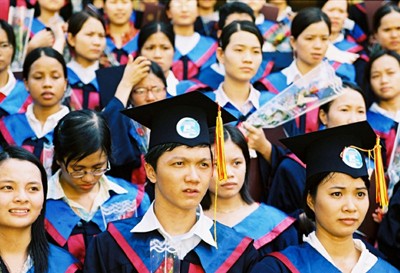(VOVworld) - One of the main topics of the on-going 6th session of the 11th Party Central Committee is promoting education and training. Accordingly, goals, tasks, and policies will be studied and adjusted to meet the demands of industrialization, modernization, and international integration. VOV reports:
 |
The Vietnamese Party and State consider education and training its top driver of socio-economic development. 16 years ago the 2nd session of the 8th Party Central Committee issued a resolution on a strategic orientation for developing education and training, and science and technology until 2010. Since then, Vietnam’s educational system has made important gains. But educational quality still suffers from backward curriculums and poor teaching and testing methods. The size of teaching and administrative staffs has not kept up with demand. Former Deputy Minister of Education and Training Doctor Banh Tien Long says it’s necessary to reform both the educational organization and content of education. "Educational reform has been unable to catch up with economic reform since 1986. Specifically, the 12-grade general education is inadequate. The curriculum covers too many subjects. Children in nursery and primary schools are growing up subjected to unnatural pressure and stress," Long elaborates.
Former Vice Chairman of the National Assembly’s Committee for Culture, Education, Youth, and Children, Nguyen Minh Thuyet, says that in order to fundamentally and drastically reform the educational system, it’s important to identify the goals and reform the economy and policies. "We have to encourage innovative ideas in the content and teaching method. If we are afraid of doing something wrong, we can’t reform. In addition, we have to drastically develop the socio-economy, and adjust human resource development policy."
Director of Vietnam’s Institute of Economy, Tran Dinh Thien, stresses the need to build an open educational system and a learning society, encourage lifelong learning, and promote e-education. Thien says passive education and training should be changed to active study which stimulates students’ creativity and initiative. "A discussion of education reform should touch upon changing viewpoints in the new era. Our educational system has emphasized input. In the international integration and national industrialization and modernization process, students must not only absorb knowledge but also learn work skills to meet the demands of society," Thien suggests.
Five keys to fundamentally and drastically reforming the educational system are evaluation of the educational situation, reasons for reform, viewpoints and principles in reforming education, general and specific targets for each educational level, and measures to improve human resource quality. The on-going 6th session of the 11th Party Central Committee is debating proper policies for reforming education.